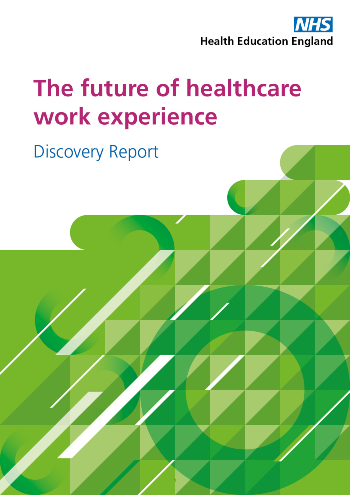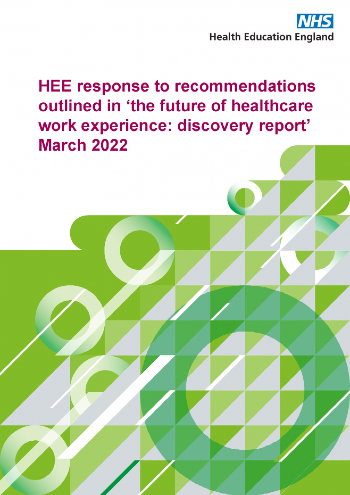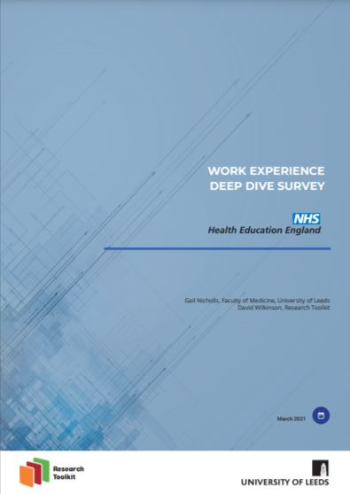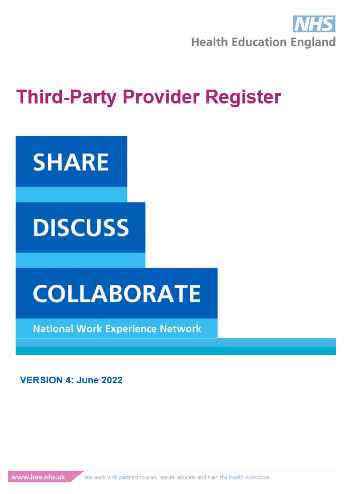You are here
Work experience and Work-Related Learning activity
Contents
Please Note: Work experience in many areas of the country has been cancelled due to COVID-19. See below ‘online alternatives to work experience’.
Work experience and work-related learning (online or in-person) presents opportunities for people to experience what it is like to work in healthcare. Both ultimately assist with attraction, engagement, recruitment activities, and transition into workforce supply pipelines such as, apprenticeships and higher education.
Why offer work experience and work-related learning?
We know that applications to university undergraduate courses in medicine, dental, health sciences, nursing and the allied health professions often require evidence of experiences in a relevant setting. HEE is also acutely aware that too often persons from underrepresent and disadvantaged groups, through no fault of their own, miss out on these opportunities.
Education providers seeking to meet Gatsby Benchmarks require ‘encounters with employers and employees’ and ‘experiences of workplaces’ and guidance from Sutton Trust on social mobility in the workplace (2020) suggests, building diverse talent pipelines can be supported through openly advertising work experience placements and considers offering such opportunities a vital part of addressing socio-economic diversity in the workplace.
In addition, providing opportunities to find out what it is like to work in healthcare will help to address challenges set out in The NHS People Plan (PP), tackle health inequalities and aid social mobility.
Work experience - terminology does it matter?
Put simply – yes.
NHS employers require a common language, to ensure transparency and set realistic expectations between new models of delivery and avoid future ambiguity, confusion, and barriers for those with a widening access and participation background accessing education, training, and employment.
The ‘Future of Healthcare Work Experience: Discovery Report’ provides additional information on the use of terminology in this space, supported by the findings of a comparative survey (presented in chapter seven) and provides a new set of definitions, that more clearly defines and distinguishes the difference between in-person work experience and online alternatives.
HEE is encouraging all health and care providers to adopt a shared common language and new definitions as detailed below.
The new definitions will be adopted within the Talent for Care quarterly returns.
Work Experience
Takes place in the workplace and allows people to experience what it is like to undertake a job supervised by staff who already work in the environment. Work experience can last half a day through to programmes over one or two weeks. Some offer hands-on experience, while some provide insights, observation, and work shadowing.
Work- Related Learning - online or in-person
Can be online or in-person. Provides a deeper understanding of the skills and knowledge required in the workplace through curated content, with clear learning outcomes. Can include skills events, simulation, demonstrations, scenarios, and technology enhanced learning methods.
Work experience provides unique insights into NHS careers - the interactions, schedules, emotions, sensations and outcomes associated with the range of roles on offer.
Health Education England has published The Future of Healthcare Work Experience Discovery Report which explores the NHS work experience landscape and looks at how it could be improved.
Contrary to widespread belief, the groups that seek work experience are not just young people but include, among others, the unemployed of all ages, those looking to change career, veterans, resettled refugees and prison leavers.
The recommended options outlined in the report are ambitious, including the development of a national work experience digital platform and service similar to NHS jobs.
The absence of work experience from the NHS Long Term Plan and Interim People Plan indicate that it is not sufficiently recognised as a mechanism of the workforce pipeline. Health Education England will publish its official response to The Future of Healthcare Work Experience Discovery Report in the autumn.
Read the full Discovery Report
Read the Discovery Report Summary
Feedback is really important to us. We would be grateful if you could give us your reaction to the Discovery Report by filling in this short survey here.
The Future of Healthcare Work Experience Discovery Report – Response Paper
Following the publication of, “The Future of Healthcare Work Experience Discovery Report”, which can be found above, we have published a paper in response which examines the recommendations that HEE is taking forward, in partnership with the wider health and care system.
We are committed to improving the offer of work experience and work-related learning to all our communities, for the benefit of individuals, health and care employers, patients and service users. This response paper sets out in practical terms how we are putting in place our strategy of implementation.
View The Future of Healthcare Work Experience Discovery Report: Response Paper
Leeds Deep Dive
The University of Leeds and research company, Research Toolkit, were commissioned by HEE to carry out research to better understand current work experience activities within Leeds Teaching Hospitals NHS Trust (LTHT) which is a large trust holding a gold standard Fair Train quality kite mark.
HEE has recently published its Future of Healthcare Work Experience Discovery Report (above). The findings from the LTHT work experience research is published alongside it so that those with an interest in this area can learn from it.
An online questionnaire was developed using Organisational Learning’s understanding of current activities within the trust along with previous national survey results. The Deep Dive explored the variety of experiences on offer throughout all areas of the trust, covering the range of trust roles, and considered the barriers and facilitators to providing these interventions and motivation for being involved. The results of the deep dive will inform the trust’s own employment strategy and interventions but also provide key recommendations for the work experience offer.
The report provides further information on the following:
- Background into research and survey
- Findings from work-related learning / employability events and work experience programmes or initiatives
- Importance of work-related learning and work experience programmes
- Summary of some of the engagement approaches supported by LTHT
- Next steps and recommendations
View a summary of the Leeds Deep Dive and its findings
What is the National Work Experience Network?
In September 2020 HEE launched the National Work Experience Network. Over 200 NHS staff members and stakeholders have joined the network forum on Microsoft Teams to share, discuss and collaborate on the delivery and management of work experience locally. This forum is for anyone working within the work experience arena at HEE or related employer (NHS).
- Across England NHS staff in trusts organise and deliver work experience placements to 15,000 prospective healthcare workers per year
- 430+ NHS staff across England are sharing resources and ideas on a Microsoft Teams channel.
- They are discussing challenges
- And collaborating on future work to save time, and money and to try and make work that bit easier
If your work includes work experience delivery in healthcare and you are interested in how you can join please contact: workexperiencetfc@hee.nhs.uk.
National Work Experience Resource Catalogue
The National Work Experience Resource Catalogue is a repository of resources that can be shared to all health and social care colleagues to support the development and delivery of online work-related learning content. Organisations and individuals can submit resources they use in order to share them with others. Anything that provides a deeper understanding of the skills and knowledge required in the workplace for any of the 350 NHS careers (with clear learning outcomes such as, skills events, simulation, demonstrations, scenarios, and Technology Enhanced Learning TEL) can be included.
To access the catalogue’s resources, please log in through the Learning Hub and search “Work Experience Resources” at the top of the screen where it says, ‘Search the Learning Hub’. Specific resources can be accessed using the search engine at the top of the catalogue.
If you would like to share a resource on this Resource Catalogue, please submit your resource through this Submission Form. This form helps our team at HEE to categorise and log content onto the catalogue. Please email workexperiencetfc@hee.nhs.uk to get involved or for more information.
HEE has created some User Guidelines of principles and attributes to consider when submitting and or using content sourced from the catalogue, this can be found on the description of the Resource Catalogue, or via the link above. This form and the guidelines will be regularly updated, as the Learning Hub develops its website.
The Learning Hub has recently extended access to users with an ac.uk account
Work Experience - Third Party Provider Register
The Third-Party Provider Register includes details of fee-for-services offering to assist with the development and delivery of online work-related learning, as an alternative to in-person work experience and careers related activities. This provides NHS employers (and others) the information required, to easily draw comparisons and make more informed decisions on the various offers.
- To view a series of Third-Party Provider events visit our youtube channel here.
Work Experience Resource Toolkits for Education Establishments and Health and Care Organisations
To help employers, teachers and career advisors organise high quality work experience placements, we have refreshed and revived four of our existing toolkits focusing on key areas of healthcare and created a further toolkit on online work related learning.
All of the toolkits can be viewed and downloaded here.
NHS Employers, commissioned by HEE, have also developed guidance for making the most of a relationship with your local Job Centre.
Work Experience Quality Standard
HEE has in place its own work experience quality standard which healthcare organisations can use. This will enable organisations to assess the quality of the work experience they provide against a set framework, as well as enabling them to display their quality award for potential work experience participants to see.
During the Autumn of 2020 HEE created and distributed a survey to understand NHS organisations’ wants and needs regarding the quality assurance of work experience. There was significant data to suggest that a HEE quality assurance framework and quality award was the preferred option.
An Action Group was then set up to create a new framework suitable for our health systems. For more information on the quality standard and instructions on how to apply, visit: Work Experience Quality Standard
Live events series
HEE Lessons Learnt: Developing an online interactive video platform (Observe GP)
This session was delivered by Michelle McAvoy who project managed and was the architect for the creation of Observe GP, an interactive video platform which is an alternative to work experience for aspiring medical students and supported by the Medical School Council.
Content covers:
- Shared how and why the platform was created.
- Demonstrated some of the features of the platform.
- Provided some of the core lessons she learnt which may be useful if you are developing online resources to complement face-to-face work experience or act as an alternative.
HEE Lessons Learnt: Developing Virtual Reality (AHP 360)
This session was delivered by Marie-Clare Wadley who is an Advanced Musculoskeletal Specialist Physiotherapist and Virtual Reality Consultant in healthcare. The aim of the AHP 360 was to bring to life what it is like to spend the day with one of the small and vital professions. Five professions are live so far with more in development. The initial focus has been those professions most at risk.
Content covers :
- Explained how and why the VRs were created
- Provided an understanding of lessons learnt, challenges faced and how these were resolved
- Illustrated how emerging technology can complement face-to-face delivery or act as an alternative.
Employability programmes are specific industry driven schemes that include an element of training and work experience, for people to develop essential skills, and possibly qualifications, that lead to increased opportunities of employment or apprenticeship in entry-level roles.
Work experience opportunities are of any length or form (other than those that fall into the definition of employability programmes) for direct experience of healthcare work within an organisational setting. This may take the form of role shadowing.
Most recently, preparation for work delivery has switched to online alternatives. These resources come in a variety of forms i.e. live webinars with clinicians, virtual workshops, interactive video or e-learning platforms. This has presented an opportunity to better understand what online alternatives can offer and how they can provide further insights into career paths in the NHS.
HEE is undertaking a discovery phase to identify what online alternatives currently exist, and are under development, where there are gaps, what evidence there is of their impact and how we can support further development moving forward.
We wish to continue supporting and encouraging face-to-face placements and all that they offer, while also benefiting from the different insights which can be presented online. A Discovery Report, including recommendations, will be made available here in April 2021.
HEE, on behalf of the NHS, is part of Movement to Work, a voluntary collaboration of UK employers committed to tackling youth unemployment through provision of high quality vocational training and work experience opportunities.



